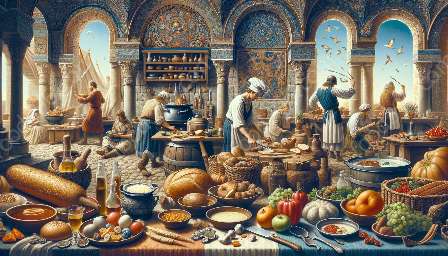Ancient Greek Food Culture: Delving into the Culinary Traditions of the Past
Ancient Greece is not only known for its rich history, philosophy, and art but also for its distinctive and vibrant food culture. The ancient Greeks placed a significant emphasis on food, and their culinary practices were intertwined with their social and cultural life. This topic cluster will take you on a journey through the culinary traditions of ancient Greece, exploring the ingredients, cooking methods, dining customs, and the social significance of food in this fascinating era. In addition, it will shed light on how ancient and medieval culinary practices have left a lasting impact on modern food culture and history.
Ancient Greek Gastronomy: Understanding the Basics
Ancient Greek cuisine was a reflection of the rich diversity of the land, comprising a blend of flavors, aromas, and textures. The core ingredients of ancient Greek food culture included olive oil, fruits, vegetables, grains, fish, and various meats, such as lamb and pork. The use of herbs and spices, like oregano, thyme, and mint, added depth and complexity to the dishes, enhancing their flavors and aromas. The Greeks were also known for their love for bread, cheese, and wine, which were integral parts of their daily diet.
The art of cooking and food preparation in ancient Greece was considered both a craft and a form of art. While the specific recipes of ancient Greek dishes may have been lost to time, archaeological findings and written records have provided valuable insights into the cooking techniques and culinary practices of the period. The Greeks employed various methods of cooking, including boiling, roasting, and baking, to create a wide array of dishes that catered to different palates and occasions.
Feasting and Social Bonding: The Role of Food in Ancient Greek Society
Food held a central place in the social and communal life of ancient Greek society. Meals were not merely a means of sustenance but were also symbolic of hospitality, camaraderie, and celebration. Ancient Greeks believed in the concept of symposium, gatherings where men would come together to indulge in food, wine, and philosophical discussions. These symposia played a vital role in fostering social connections and intellectual exchange among the elite class.
Furthermore, public feasting and religious festivals were occasions for the entire community to bond, share stories, and honor their gods through culinary offerings. The lavish banquets, known as symposia, were characterized by the abundance of food and wine, accompanied by music, poetry, and dance, creating an atmosphere of merriment and revelry.
The dining etiquette and customs of the ancient Greeks were steeped in tradition and ritual. Symposia and private gatherings followed strict protocols, emphasizing the ideals of hospitality, respect, and graciousness towards guests. From the seating arrangements to the serving of food and libations, every aspect of the dining experience was laden with cultural significance and symbolism, reflecting the values and beliefs of the society.
The Legacy of Ancient and Medieval Culinary Practices
The culinary practices of ancient Greece have had a lasting impact on the development of gastronomy and food culture throughout the medieval period and into the present day. The emphasis on fresh, seasonal ingredients, the artful blending of flavors, and the communal nature of dining have all left an indelible mark on the evolution of culinary traditions.
The medieval period saw the continuation and evolution of many ancient Greek culinary practices. The Byzantine Empire, in particular, inherited and adapted elements of ancient Greek gastronomy, incorporating them into its own culinary repertoire. The widespread use of olive oil, the cultivation of vineyards, and the preservation of fruits and vegetables through drying and pickling were all inherited from ancient Greek practices and continued to thrive throughout the medieval era.
Moreover, the cultural exchanges and trade routes that characterized the medieval world facilitated the dissemination of culinary knowledge and ingredients across diverse regions, leading to the fusion of flavors and the emergence of new culinary traditions. This interplay of ancient and medieval culinary practices laid the groundwork for the diverse and rich tapestry of global gastronomy that we celebrate today.
Exploring Food Culture and History through Ancient Greek Gastronomy
Ancient Greek food culture offers a captivating lens through which to explore the historical, social, and cultural dimensions of food. By delving into the culinary traditions of ancient Greece, we gain valuable insights into the significance of food in ancient and medieval societies, as well as its enduring influence on modern food culture and history. Exploring the art of cooking, the rituals of communal dining, and the legacy of ancient and medieval culinary practices allows us to appreciate the profound impact of food on human civilization and the continuous evolution of gastronomy.
Embarking on this journey through the world of ancient Greek food culture provides a deeper understanding of the connections between food, history, and society, inviting us to savor the flavors and stories that have shaped our culinary heritage.

